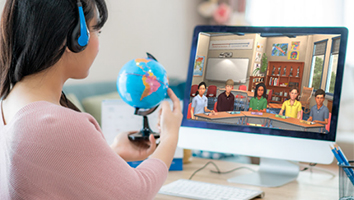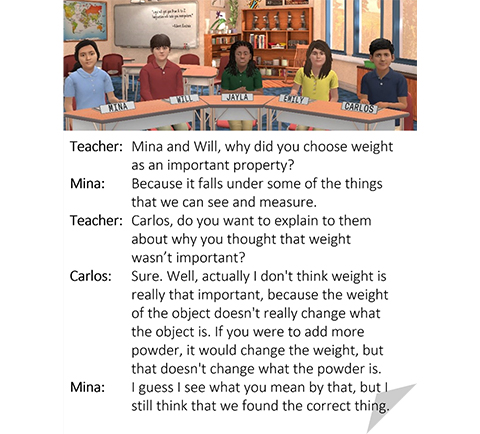Can Simulated Classrooms Help Teachers Deliver Better Instructional Quality?
By Jamie N. Mikeska, ETS Senior Research Scientist, Heather Howell, ETS Research Scientist, and Devon Kinsey, ETS Research Associate
September 29, 2023
Teachers, especially those who are at the beginning of their careers, need safe spaces where they can practice learning new skills that will help them to improve student learning. Teacher educators, professional development facilitators and district leaders also need access to approaches and tools that will enable them to support teachers’ learning so teachers can improve their proficiency in the latest, innovative, and effective teaching practices. One solution to these related challenges is the use of online simulated classrooms where teachers are empowered to try out new instructional strategies, receive feedback, and try again — all without causing any harm or negative impact on real students.
 Our research team at ETS has partnered with Mursion®, a technology company that designs and uses mixed reality environments to support immersive learning for the workplace, to create opportunities for pre-service teachers, who are elementary teachers in training. Together, we are enabling pre-service educators to engage in a critical teaching practice in mathematics and science — facilitating discussions to engage students in argumentation. During each mathematics or science discussion, five student avatars in Mursion’s simulated upper-elementary classroom interact with a pre-service teacher by sharing in real-time their own ideas; responding to questions; restating another student’s ideas; or offering a rebuttal or critique of an idea shared. The student avatars are controlled by an actual person, a simulation specialist, who cannot be viewed by the teacher but who uses specialized technology to move and sound like upper-elementary students.
Our research team at ETS has partnered with Mursion®, a technology company that designs and uses mixed reality environments to support immersive learning for the workplace, to create opportunities for pre-service teachers, who are elementary teachers in training. Together, we are enabling pre-service educators to engage in a critical teaching practice in mathematics and science — facilitating discussions to engage students in argumentation. During each mathematics or science discussion, five student avatars in Mursion’s simulated upper-elementary classroom interact with a pre-service teacher by sharing in real-time their own ideas; responding to questions; restating another student’s ideas; or offering a rebuttal or critique of an idea shared. The student avatars are controlled by an actual person, a simulation specialist, who cannot be viewed by the teacher but who uses specialized technology to move and sound like upper-elementary students.
For example, in our Mystery Powder science discussion task (PDF), the teacher’s goal is to facilitate a discussion with the five student avatars to help them come to consensus on the identity of the mystery powder and determine which properties are most useful in identifying the substance. The five student avatars begin the discussion with different claims about what the mystery powder is and use varied evidence-based reasoning to support their initial claim. The pre-service teacher’s goal is to facilitate the argumentation-focused discussion to encourage the students to work together to persuade one another and leverage empirical data collected earlier to determine what the mystery powder is and its specific properties.

Our research team recently published two new manuscripts (Mikeska et al., 2022; Mikeska et al., 2023) that report on the outcomes of two studies that were funded by the National Science Foundation (NSF) (grants 1621344 and 2032179), where we integrated the use of one or more performance tasks into elementary mathematics and science methods courses at various universities across the United States. Each performance task provided an opportunity for pre-service teachers to practice facilitating an argumentation-focused discussion on either a mathematics or science topic with the student avatars. In each case, pre-service teachers received support from a university-based teacher educator who helped prepare them to facilitate the discussion and then worked with them to debrief and reflect on their simulated classroom experience afterwards. The findings from these studies on pre-service teacher learning provides evidence that:
- Using simulations as part of teacher education coursework significantly improves pre-service elementary teachers’ ability to facilitate argumentation-focused discussions.
- The benefits of using simulations are maximized when teachers have structured and scaffolded opportunities to prepare for, and reflect on, the simulated teaching experience.
- Providing supports, such as written formative feedback, help teachers learn about and understand specific teaching moves they can practice during the simulations.
- Teacher educators use different pedagogical activities to support teachers’ preparation and learning from simulated teaching and draw upon varied pedagogical purposes when engaging teachers in these pedagogical activities.
- Teachers and teacher educators value simulated teaching across varied content and site contexts, which suggests wide applicability.
We encourage teacher education programs, school districts and professional development programs to incorporate simulated teaching experiences into their repertoire of substantive learning opportunities for all teachers to help them develop their instructional skills and gain confidence and teaching expertise. This novel approach provides a way for teachers to hone their craft and practice specific aspects of teaching in safe, reduced complexity settings while improving their ability to engage in important teaching practices that make an impact in student learning.
To learn more about this topic and access publicly available project materials, go to the Qualitative Data Repository to register and create a free account. After registering and logging in, search for the “GO Discuss” research project or go directly to the GO Discuss repository collection. This collection includes one data project for each of the eight performance tasks our team developed on the NSF GO Discuss project (grant #1621344), plus a data project for the non-task specific simulation specialist training materials and another data project for the scoring materials. When you click on an individual data project, you can either download all the files associated with the data project by selecting “Download Data Project” below the data project name, or you can download individual files by selecting the arrow next to the individual file name. We recommend reading the “GO Discuss Data Overview” file first; this file is available in each of the 10 data projects.
References
Mikeska, J. N., Howell, H., & Kinsey, D. (2023). Inside the black box: How elementary teacher educators
support pre-service teachers in preparing for and learning from online simulated teaching experiences. Teaching and Teacher Education, 122. Advance online publication. https://doi.org/10.1016/j.tate.2022.103979
Mikeska, J. N., Howell, H., & Kinsey, D. (2022). Do simulated teaching experiences impact elementary
pre-service teachers’ ability to facilitate argumentation-focused discussions in mathematics and science? Journal of Teacher Education. Advance online publication. https://doi.org/10.1177/00224871221142842